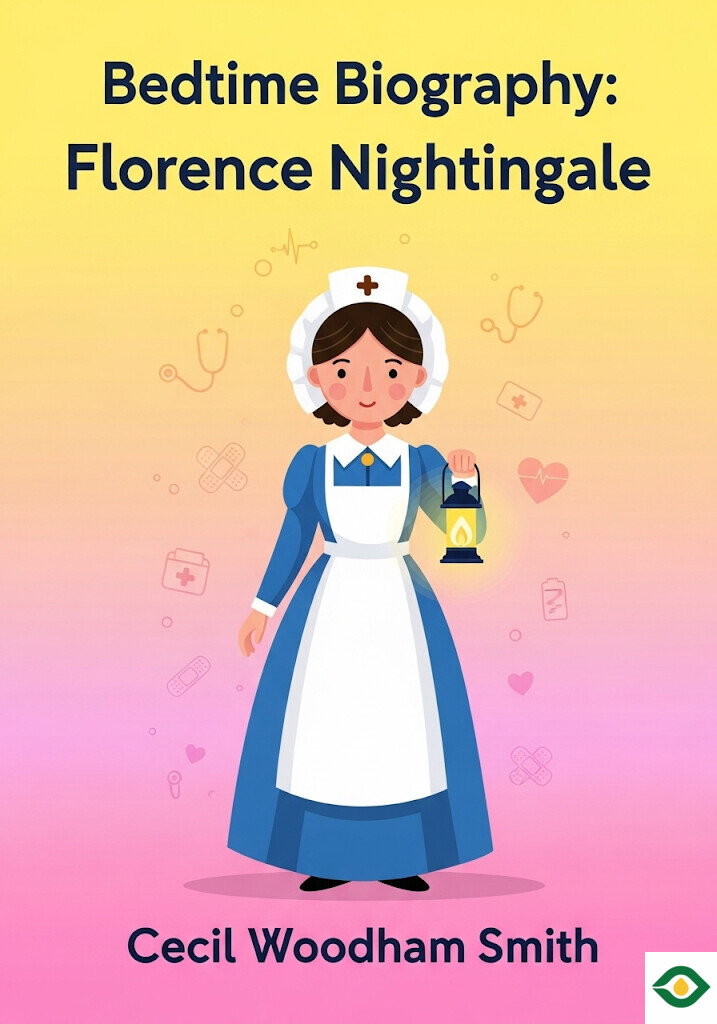Description
Florence Nightingale is remembered as one of the most important figures in the history of modern nursing. Born in 1820 in Florence, Italy, she grew up in a wealthy English family with every privilege and comfort. Her parents expected her to live a traditional life as a society woman, attending parties, traveling across Europe, and perhaps marrying into another wealthy family. But from an early age, Florence was different. She was thoughtful, restless, and deeply moved by the suffering of others.
At just 16 years old, Florence had a powerful spiritual experience that she described as a calling from God to serve humanity. From that moment, she felt her life had a special purpose. She wanted to dedicate herself to helping the sick and poor. However, nursing at that time was not considered a respectable profession for women of her class. In fact, hospitals were often dirty, poorly managed places, and nurses had very little training. When Florence first told her family about her dream of working in hospitals, they were horrified. Her mother wept, and her father avoided the subject in disappointment. They believed she was throwing away her future.
Despite their resistance, Florence refused to give up. For many years, she lived a double life—attending social events to please her family, but secretly reading reports on hospitals and visiting medical institutions whenever she could. She studied mathematics and statistics, skills that would later make her work in public health especially powerful. Eventually, in 1853, she became the manager of a small hospital for women in London. She worked tirelessly, overseeing everything from hygiene and plumbing to patient care. She insisted that people from all faiths and backgrounds be treated equally, something unusual at the time.
Her greatest test came the following year during the Crimean War. The British Army asked Florence to lead a team of nurses to care for wounded soldiers. When she arrived at the military hospital in Scutari, she was shocked. The conditions were appalling—dirty, overcrowded, and lacking even the most basic supplies. Soldiers were dying not just from their injuries, but from diseases like cholera and dysentery. The doctors in charge were at first dismissive of Florence and her nurses, but she quickly proved herself.
Florence organized a strict cleaning routine, brought in better food, soap, and bedding, and made sure supplies were distributed fairly. She worked long hours herself, often late into the night, carrying a lamp as she visited the wards. This earned her the famous nickname “The Lady with the Lamp.” Soldiers adored her, and her reforms saved countless lives. Mortality rates in the hospitals fell, and news of her efforts spread back home. She became a national hero in England, celebrated in newspapers and songs. But Florence did not enjoy fame. She was focused on saving more lives and improving medical care everywhere, not just in war.
After the war, Florence used her new influence to push for reforms. She persuaded the government to create a commission to study hospital conditions and army health. She spent months analyzing data, writing reports, and proving through statistics that sanitation and proper nutrition could prevent disease. Her findings shocked many officials but also forced them to make changes. Because of her, hospitals across the British Empire began adopting stricter hygiene standards.
In 1859, she published Notes on Nursing, a short but groundbreaking book. Written in clear, simple language, it explained how to care for the sick not only in hospitals but also at home. It emphasized cleanliness, fresh air, nutrition, and kindness. The book became a bestseller and was translated into many languages, spreading her ideas far and wide.
The following year, she founded the Nightingale Training School for Nurses at St. Thomas’ Hospital in London. This was a revolutionary step. Nursing, once seen as unskilled and even shameful work, was transformed into a respected profession. Her school provided strict and detailed training, with both practical and moral standards. Many graduates went on to start nursing schools of their own, spreading Florence’s vision across the world.
Even as her health declined—she suffered from chronic illness for much of her life—Florence never stopped working. She continued writing reports and advising governments, not just in Britain but also in other countries like India, where she argued for better sanitation to prevent epidemics. She also campaigned to improve the conditions of workhouses and poor hospitals in England.
As she grew older, Florence became gentler and more philosophical. She wrote about religion, service, and the role of women in society. Though she often struggled with depression and loneliness, she never abandoned her mission. She reconciled with her family, and young nurses would often visit her for advice and encouragement.
Her impact was enormous. By the time of her death in 1910, the world of nursing had been completely transformed. When Florence was born, there were no real nursing schools. When she died, there were thousands. She had shown that science, compassion, and dedication could change the way the world treated the sick. She had raised nursing to a noble calling, one that deserved respect and admiration.
Florence Nightingale’s story is one of courage and determination. She faced opposition from her family, resistance from doctors, and the hardships of war, but she never gave up on her calling. Through her tireless efforts, she not only saved lives but also built the foundation of modern nursing. Today, every nurse who takes an oath of service, every hospital that values cleanliness and patient care, and every act of compassion in medicine carries a piece of her legacy forward.





